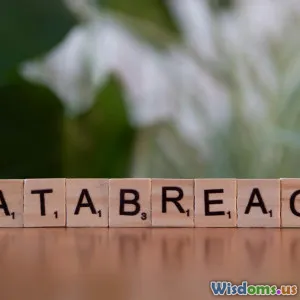
Can Anonymous Hacktivism Really Change World Politics
8 min read Discover how Anonymous hacktivism impacts world politics and its power to unveil global secrets. (0 Reviews)
Can Anonymous Hacktivism Really Change World Politics?
Introduction
In the digital age, where information has become the most valuable currency, the enigmatic group known as Anonymous has surged to the forefront of hacktivism—a fusion of hacking and activism. Operating in the shadows under the veil of anonymity, this decentralized collective has targeted governments, corporations, and secretive organizations in a bid to expose hidden truths and effect political change. But a key question remains: Can Anonymous hacktivism genuinely alter the landscape of world politics, or is it a flash in the pan, a mere disturbance in the cyber corridors of power?
This article dives deep into the workings of Anonymous, exploring whether their actions can transcend the digital domain to create real-world political consequences. We assess the catalysts, successes, limitations, and ethical implications of their endeavors, especially in a world rife with secret societies and organizations resistant to transparency.
Understanding Anonymous: The Modern-Day Digital Guerrilla
Origins and Ethos
Anonymous began as a loose collective of internet users around 2003 on platforms like 4chan. Characterized by the iconic Guy Fawkes masks and a lack of clear leadership, it embodies a radical embrace of anonymity and collective action. Motivated by ideals of freedom of information, resistance against censorship, and the fight against oppressive regimes, their actions often blur lines between vigilantism and activism.
Methods and Targets
Their tactics range from Distributed Denial of Service (DDoS) attacks to data leaks and defacements. For example, in 2010, Anonymous launched “Operation Payback” targeting organizations perceived as attacking WikiLeaks, demonstrating their capacity to coordinate large-scale cyber disruptions.
Governments with authoritarian tendencies, such as Syria and Tunisia during the Arab Spring, corporations engaged in questionable practices, and secret societies, are common targets. By revealing hidden agendas—such as exposing oppressive surveillance or unethical corporate practices—they aim to hold power accountable.
Secret Organizations and Societies: The Shadows Behind World Politics
The Role of Hidden Networks
Secret societies and clandestine organizations have been intertwined with global politics for centuries. Groups like the Bilderberg Group, Freemasons, or intelligence agencies operate behind closed doors, influencing decisions beyond public scrutiny. Anonymous seeks to dismantle these veils of secrecy, betting that transparency will foster democratic accountability.
Case Study: The Stratfor Leak
In 2011, Anonymous targeted Stratfor, a private intelligence firm, releasing over five million internal emails. The leak unveiled surveillance operations, government spying collaboration, and backroom political dealings—an unprecedented exposure of how secret intelligence shapes geopolitical agendas.
This act fueled public dialogue on intelligence overreach and highlighted the power hacktivists wield in piercing secrecy traditionally guarded fiercely by such organizations.
Impact on Global Political Movements
Catalyzing Social Change: The Arab Spring
Anonymous played a notable role during the Arab Spring uprisings. By launching Operation Tunisia and Operation Egypt, they attacked government websites and helped activists communicate securely when regimes attempted to shut down internet access.
These contributions, while digital, had tangible effects, easing communication for protesters and undermining authoritarian attempts at control—underscoring the capacity of hacktivism to influence political revolutions.
Exposing Corruption and Promoting Accountability
In countries like Kenya and Brazil, Anonymous has leaked documents alleging corruption among politicians, amplifying calls for reform. These leaks often translate into public protests and governmental acknowledgment, underlining hacktivism’s role as a force multiplier in political transparency.
Limitations and Ethical Challenges
Anonymity vs. Accountability
The very anonymity that empowers Anonymous also clouds accountability. Critics argue that their actions can be reckless, damaging uninvolved parties or infringing upon privacy rights. The lack of centralized governance complicates assessing the legitimacy of their interventions.
Legal and Diplomatic Repercussions
Several nations consider hacktivism a form of cyberterrorism. Crackdowns on individuals linked to Anonymous illustrate risks associated with this form of activism. Additionally, governments may use such events to justify increased surveillance, ironically tightening control rather than loosening it.
The Future of Hacktivism in World Politics
Emerging Technologies and Greater Reach
As technology evolves—think AI, blockchain, and quantum computing—hacktivist tactics are likely to grow more sophisticated. The potential to disrupt or expose even more entrenched corners of global power increases, but so does the complexity of safeguarding ethical considerations.
Toward Legitimate Political Influence?
While Anonymous presently straddles a gray zone between outlaw status and heroic intervention, there is a future possible where hacktivism informs policy-making through exposing facts and mobilizing communities. The challenge is balancing transparency with respect for due process and privacy.
Conclusion
Anonymous hacktivism undoubtedly injects a new paradigm into world politics by wielding digital tools to uncover secrets and challenge opaque structures. Its impact resonates in social revolutions, anti-corruption campaigns, and public awareness, demonstrating a capacity to shape narratives and political landscapes.
However, without clear accountability and ethical frameworks, their influence will remain unpredictable and controversial. Hacktivism alone cannot redraw global power maps—political change requires institutional response and public engagement coupled with technological disruption.
Ultimately, Anonymous represents both the promise and peril of modern digital resistance: a mirror held to secret power illuminating both its vulnerabilities and the democratic challenges of an interconnected world.
References:
- Coleman, G. (2014). Hacker, Hoaxer, Whistleblower, Spy: The Many Faces of Anonymous. Verso Books.
- Dawn, J. (2012). “Anonymous and the Arab Spring.” Cybersecurity Journal, vol. 5, no. 3.
- Greenberg, A. (2013). This Machine Kills Secrets. Dutton.
- Stratfor Email Leak. WikiLeaks, 2011.
Engage with this topic further by examining how secrecy in global institutions shapes governance and how citizen-led interventions transform transparency in the digital era.
Rate the Post
User Reviews
Popular Posts




















